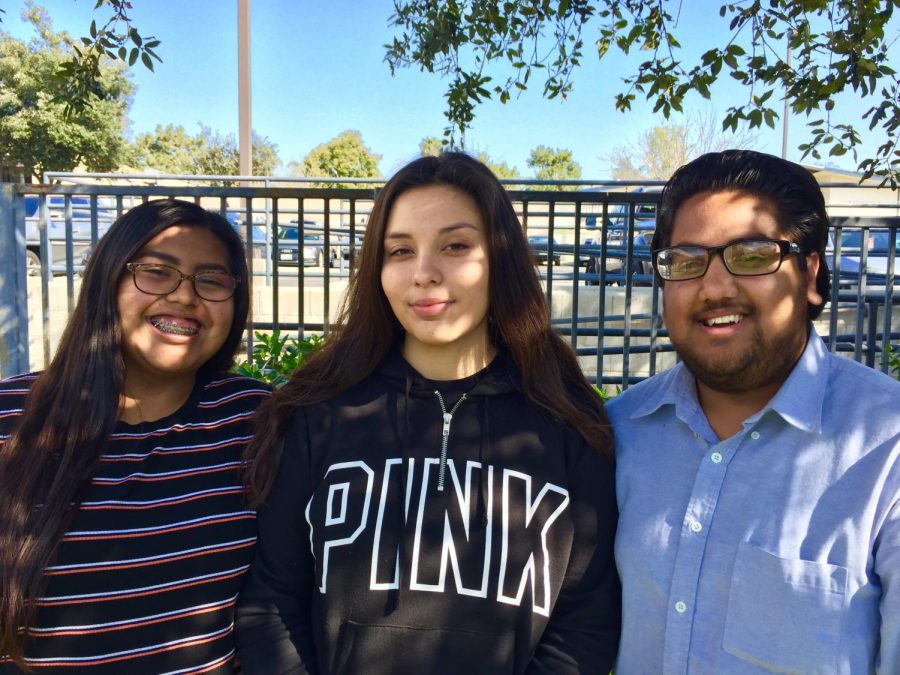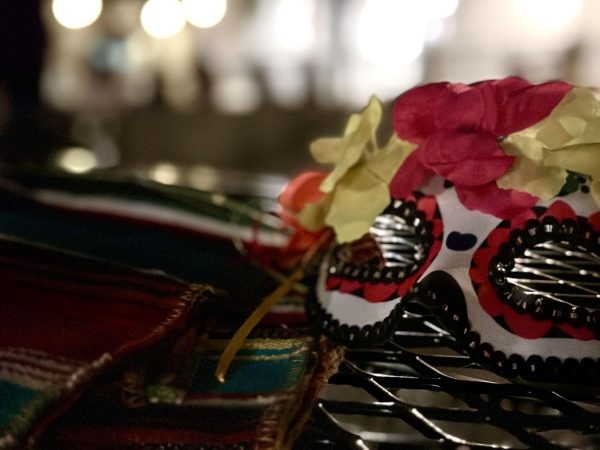First-generation college students break barriers with AVID
AVID is a program at Foothill that helps students go to college by providing free educational resources and guidance.
Jocelyn Soriano ’19, Jay Garcia ’19 and Josiah Beharry ’19 (from left to right).
Quick glances and prideful smiles were exchanged, then the three of them exclaimed in synchrony: “We all got into college!”
Jocelyn Soriano ‘19, Jay Garcia ‘19 and Josiah Beharry ‘19 were responding to the question of how Foothill’s Advancement Via Individual Determination (AVID) program has changed their futures.
The journey to that response was not an easy one. Unlike some of their more privileged peers, their path to college was not paved by meticulous parental guidance or pressure. Soriano’s parents didn’t make it past fourth grade; Garcia’s and Beharry’s parents didn’t receive higher education either.
Despite the odds, the three of them, all of whom are either children of immigrants or immigrants themselves, will be first-generation college students.
In addition to their individual drive, AVID helped put them “on track for college,” as Beharry said. AVID is a non-profit system that collaborates with around 6,000 elementary to upper-level schools to provide student-centered learning resources.
“The idea of AVID is to help kids who are capable of going to college, but they just don’t know how to get themselves to there,” Foothill’s AVID advisor Sarah Page explained.
Soriano, who has been a member of AVID since middle school, is now the president of Foothill’s AVID program. She wants to break the misconception that college is only available to students who have a 4.0 GPA or other seemingly unattainable educational measures, especially for those like her who are balancing school while working multiple jobs.
Soriano doesn’t have that elusive 4.0 GPA. Yet, proving her point exactly, she’s already been accepted to seven universities.
In between pauses of wide-eyed fascination, Soriano expressed, “I would have never imagined myself getting into seven colleges. I got into college. That’s crazy. I’m still like ‘what the heck…’ I’m surprised. I just can’t believe it.”
Garcia, who’s the vice president of AVID, described that before high school, she and the people she hung out with didn’t care or think about college. But even then, she was passionate about helping others and doing math. She just didn’t know what to do next, and there wasn’t guidance at home. In sophomore year, she joined AVID and received the career advice she’d sought for years. In a few months, Garcia will be attending a university to become a registered nurse.
“I now have friends that care about my future and their future,” Garcia added.
Beharry described AVID as a class that’s especially beneficial to those who come from disadvantaged backgrounds.
“It’s a class made up of minorities because we don’t come from affluent families,” Beharry explained. “We come from families who’ve struggled with going to college, going to school, staying in school. A lot of us are even the first to graduate high school. We don’t have the support or information from our families, so we’re just trying to do that on our own.”
Thus, with these similar backgrounds, AVID is known to have a family-like support system of mutual understanding and respect.
“They understand and congratulate you for the ‘small’ things,” Garcia says. These “small things” are oftentimes not small at all, but instead overlooked.
For example, last year, Beharry earned an A in a math class for the first time in his entire academic career. He still vividly remembers when AVID instructor Heather Ferris announced his accomplishment and congratulated him in class. He received the same support last semester when he earned his first ever 4.0 GPA or now as he’s already been accepted to nine universities. He’s never felt that proud or supported in his other classes.
“It speaks volumes when you realize you can step into AVID and you feel like you belong, and when you step out, sometimes you just don’t,” Beharry described.
In addition to the family atmosphere, AVID provides a variety of free educational guidance and resources that help students in achieving high school excellence, applying and paying for college and discovering future careers.
Below are a few (but not all) of the resources that AVID provides.
Tutorials
Twice a week, AVID students get class time to receive help on homework from college-level tutors. These tutors each specialize in different subjects like math, English, science and history.
Soriano thinks that it’s especially beneficial that the tutors are all college students. Since students don’t personally know the tutor, they won’t be afraid or embarrassed to ask questions, which is often a problem when students seek help from teachers or peers.
SAT and ACT Test Prep
Much of junior year is dedicated to helping students get familiar with either the SAT or ACT. This is especially important because these standardized test scores are typically a considered factor in the college admissions process. During class time, students take rigorous preparation courses and receive prep materials designed to help them achieve higher scores.
While there are some test prep classes and private tutoring that cost hundreds to thousands of dollars, AVID students receive test preparation at zero cost.
Professional Mentorship
During senior year, AVID students get matched with a professional in their desired future career. During class time, students meet once a month with their mentor. This program not only allows students to get direct insight and advice about their career of interest, but they also learn universal skills critical to finding jobs, such as writing a cover letter, building a resume and getting interviewed.
As Garcia put it, “AVID helps you learn certain life skills for the future that no one else will help you with.”
Beharry, who’s planning on majoring in business, meets once a month with a real estate agent. Through this experience, he’s now more knowledgeable and interested in that specific sector of business. Likewise, Soriano, who is interested in becoming a nurse, is currently receiving guidance from a family nurse practitioner.
All-Expenses-Paid College Tours
During both sophomore and junior year, students get a three-day and two-night all-expenses-paid trip to go college-touring in both Southern and Northern California. Some schools that they’ve visited include Cal Poly SLO, San Jose State and UC Merced.
Soriano notes that it’s difficult to go college-touring on her own, since both she and her parents have stringent work schedules, and travel expenses can outweigh the benefits of visiting.
However, to high school students, seeing San Marcos’s amphitheater or walking across Fullerton’s vast campus can evoke excitement for college.
Garcia, for example, was inspired to apply to three schools she visited through AVID’s trips. Now, a year later, she has been accepted to all three.
Special Curriculum
During all years of AVID, students have the opportunity to have intimate and empathetic discussions on topics or experiences that oftentimes don’t have allocated space in the standard curriculum.
For example, AVID’s sophomore year curriculum features literature from authors that have similar backgrounds to the students in the class—either first-generation college students or ethnic minorities.
To Soriano, what’s most fascinating about these novels is that they’re about marginalized people who have nonetheless succeeded.
“It gives us hope,” Soriano said. “We think, ‘wow, that could be us.’”
Everything is FREE
Despite the plentitude of resources that AVID provides, students don’t have to pay anything to be part of the program.
Any student can make going to college possible by being a part of AVID. All you have to do is apply.
The application window for the 2019-2020 school year will be due on Wednesday, April 10 for incoming juniors and senior. Unfortunately, the application window for incoming sophomores is already closed.
For any questions, students can contact AVID advisor Sarah Page at [email protected].
You can find the AVID application here.










Franz Estabaya • Mar 30, 2020 at 4:17 pm
Thank you for writing this article.
Gemma • Mar 26, 2019 at 8:46 am
I love this article! I knew very little about the AVID program before reading this. I am so glad AVID exists! It’s a much needed program!
Anonymous • Mar 26, 2019 at 12:27 am
I would like to start by saying that their accomplishments are great and shouldn’t be undermined. But the Anti-White left leaning undertones of what should be a simple apolitical article is disturbing. Journalistic integrity should take priority over outside bias. Using worlds like “privileged” do nothing but deepen divides in american society.
Heather Ferris • Mar 25, 2019 at 11:46 pm
Thank you for writing such a wonderful article about AVID and these truly inspirational students. These three seniors and MANY others in AVID have the most impressive work ethic and have earned every bit of success they are enjoying. Many people have the misconception that AVID is a remedial program when, in actuality, it’s the exact opposite of that and those students who value the program can experience positive results like these remarkable seniors!